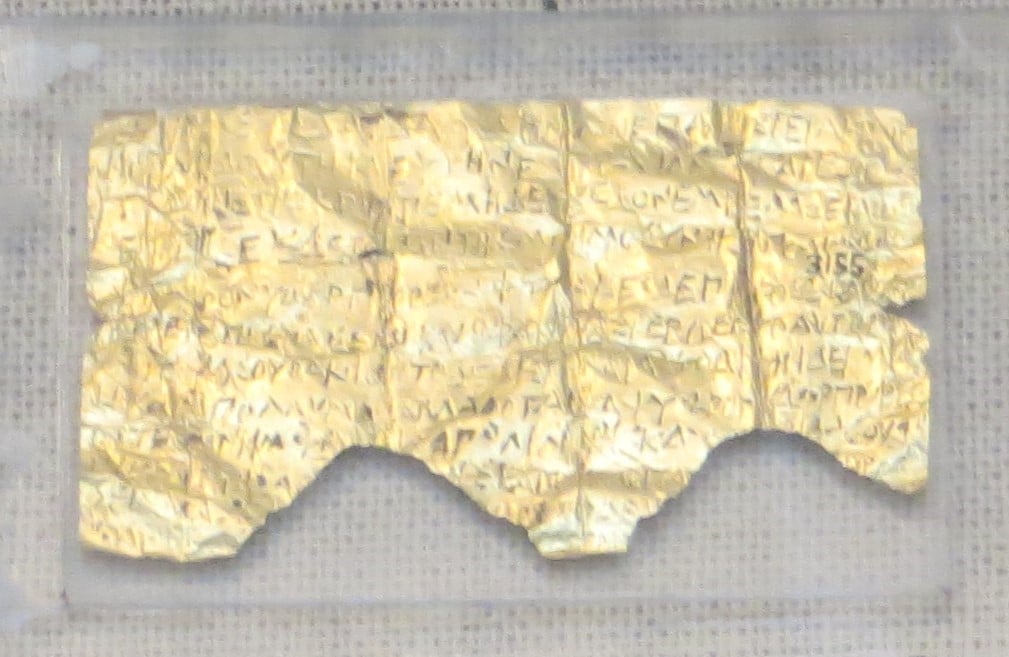

The ancient Greeks were deeply interested in the concept of the afterlife, much like the Egyptians, who explored it in works such as the renowned Book of the Dead. The Petelia Gold Tablet is a notable ancient Greek text that sheds light on the soul’s journey to the afterlife and the essential steps required to navigate it.
The Petelia Gold Tablet is the name of an ancient artifact detailing the journey to the Greek afterlife. It is not actually a tablet but rather a thin sheet of gold foil. It is thin enough that it can be rolled up, as it was in ancient times.
The Tablet dates back to about the third century BC, or possibly the fourth century BC by some estimates. It is likely that the owner took it with them to the grave. Later, it would appear that someone in the first or second century CE found it and took it for themselves. The alternative is that it was passed down as an heirloom for centuries.
In any case, this latter owner rolled it up and placed it in a small gold case on a chain. Unfortunately, it did not completely fit within the case, so the owner clipped off the part that was sticking out. Because of this, the reading of the final line remains a mystery.
Fortunately, the vast majority of the tablet is intact and readable. What does it say about the ancient Greek afterlife? The following is a translation of the Petelia Gold Tablet, aside from the broken final line:
“You will find a spring on your left in Hades’ halls
and by it the cypress with its luminous sheen.
Do not go near this spring or drink its water.
You will find another, cold water flowing from Memory’s lake;
its guardians stand before it.
Say: ‘I am a child of Earth and starry Heaven,
but descended from Heaven; you yourselves know this.
I am parched with thirst and dying: quickly, give me
the cool water flowing from Memory’s lake.’
And they will give you water from the sacred spring
and then you will join the heroes at their rites. This [is the …. of Memo]ry: [on the point of] death ] write this [ ] the darkness folding [you] within it
As we can see from this translation, the text provides the reader with instructions about what to do to receive entry into the specific afterlife in question. Greek mythology spoke of more than one afterlife.

According to the instructions for the ancient Greek afterlife seen on the Petelia Gold Tablet, the reader had to avoid the spring on the left in Hades‘ halls. This was next to a cypress tree. Instead, the departing soul was to go to the cold water flowing from Memory’s lake.
At this body of water, there were guardians. One had to speak to these guardians and request this cold water. Upon being approved, the guardians would offer this water to the person and they would subsequently be allowed to “join the heroes at their rites.” This evidently means they would be with the heroes of Greek mythology in the afterlife.
Another fascinating part of these instructions is seen in the statement about what to say to the guardians. The person had to say: “I am a child of Earth and starry Heaven, but descended from Heaven; you yourselves know this.”
Scholars generally understand this to be a reference to the idea that humans were actually gods in a former life. After a sojourn in the flesh, a person would then return to their former divine existence. The Petelia Tablet is far from the only reference to this ancient Greek belief about the afterlife.
Although there is some debate on this point, most scholars hold that the beliefs described on the Petelia Tablet are Orphic beliefs. That is, they come from the sacred tradition founded by the legendary ancient Greek seer known as Orpheus.
Those who followed his teachings were called Orphics, and they held their annual mysteries on the Eleusinian plains west of Athens, where sacred rituals and initiations took place.
The mysterious cult of Orphism was a secretive sect in ancient Greece. Like all such groups, only those who were initiated could access the full truth of its practices and beliefs. The followers of this cult held a strong faith in reincarnation.
Unlike the public rituals of Greek polytheism, the Orphic Mysteries were esoteric, meant for initiates who sought a deeper understanding of their own existence and the cosmos. Their beliefs influenced later philosophical thought on the soul and afterlife.
